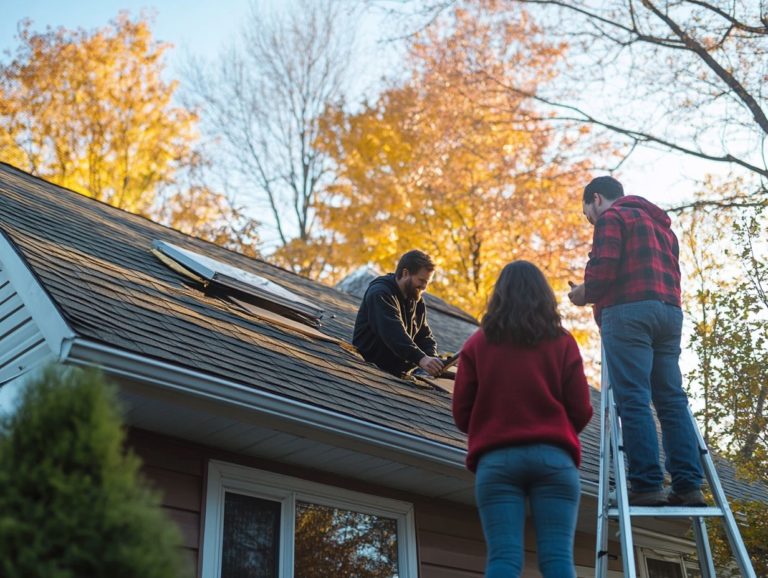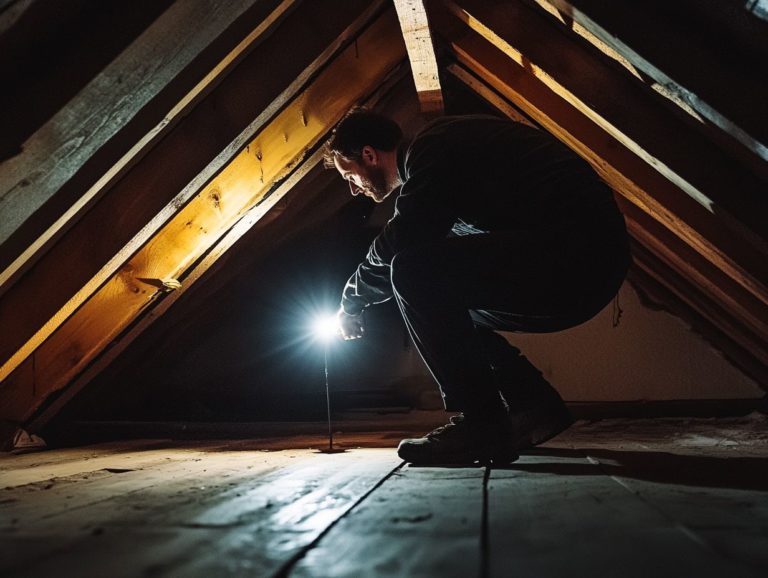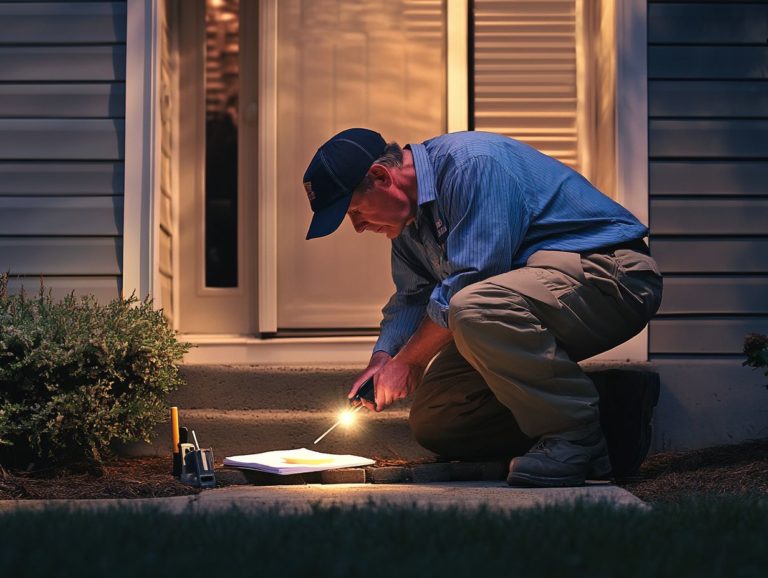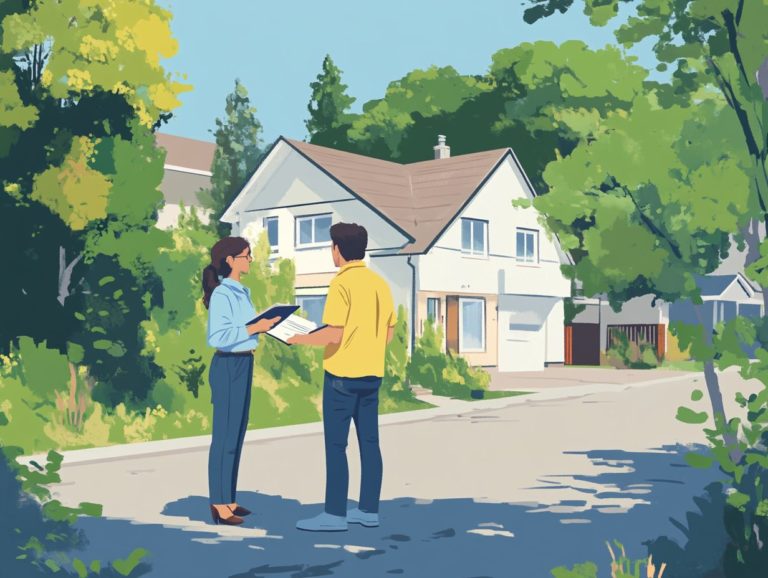The Importance of Home Inspections for Buyers
When you re in the market for a home, grasping its condition can spare you from future headaches.
Home inspections are a pivotal part of this journey, uncovering hidden issues and guiding your decision-making process. This article delves into what a home inspection involves, the benefits it offers including enhanced negotiating power and the optimal timing for scheduling one.
You ll discover what to expect during the inspection, tips for selecting the right inspector, and the various factors that can influence inspection costs. Equip yourself with knowledge that can truly transform your home-buying experience!
Contents
Key Takeaways:

Home inspections provide valuable information about potential issues, allowing buyers to make informed decisions about their purchase. Understanding the importance of pre-purchase home inspections helps buyers identify issues early on, giving them the opportunity to negotiate for repairs or a lower price, ultimately saving them time and money in the long run.
It is important for buyers to schedule a home inspection before finalizing a purchase, as the importance of a home inspection for buyers can affect their decision and potentially save them from unexpected expenses in the future.
Understanding Home Inspections
Understanding home inspections is essential for you as a home buyer, particularly if it’s your first time navigating this journey. Knowing the importance of home inspections for buyers can help uncover potential issues that might not be visible at first glance.
The home inspection process is a careful check of the property s condition, designed to ensure safety, longevity, and adherence to local regulations.
During the inspection, a certified home inspector examines critical elements such as structural integrity, heating, ventilation, and air conditioning systems, plumbing, and electrical systems.
You’ll receive a comprehensive report that highlights safety risks and hidden problems. This helps you avoid expensive repairs down the line.
What is a Home Inspection?
A home inspection is an in-depth evaluation of a property conducted by a qualified home inspector, aimed at uncovering any existing or potential issues.
During this process, you’ll see various components of the property being meticulously scrutinized. Key areas include:
- The stability of the foundation
- The condition of the roofing
- The integrity of plumbing and electrical systems
Inspectors also focus on health and safety elements, such as air quality and the presence of mold or pests.
Beyond just assessing the physical structure, inspectors provide a thorough inspection report that outlines their findings. This report is invaluable for both buyers and sellers.
For prospective buyers, it serves as a vital tool for making informed decisions. For sellers, it highlights necessary repairs or improvements that could boost the property’s market value.
The Benefits of Getting a Home Inspection
Getting a home inspection can significantly boost your confidence as a buyer! Securing a home inspection allows you to pinpoint potential issues before finalizing your home purchase, which underscores the importance of home inspections for new homeowners and ensures you make an informed decision.
Identifying Potential Issues
A home inspection is crucial for uncovering potential issues, such as structural problems, safety risks, and the presence of harmful mold allergens. Understanding the importance of home inspections for real estate transactions reveals important details about the property’s condition.
Inspectors typically assess the heating, ventilation, and air conditioning systems to ensure they function efficiently and comply with safety regulations. They check plumbing for leaks, corrosion, and adequate water pressure, while electrical systems are scrutinized for outdated wiring or code violations.
The roofing is examined for any signs of wear, damage, or leaks that could lead to costly repairs down the line. By conducting these thorough evaluations, inspectors empower you to make informed decisions about the safety and livability of the property.
Don t wait too long schedule your home inspection today to avoid unexpected surprises!
Ready to take the next step? Schedule your home inspection now!
Negotiating Power for Buyers

A thorough home inspection arms you with invaluable negotiating power by uncovering issues that can be addressed before you seal the deal on your purchase.
When essential repairs, like electrical or plumbing problems, come to light during the inspection, you can use these revelations to request concessions. For example, if the report highlights a roof leak, you might negotiate for the seller to cover the full cost of repairs or suggest a reduction in the purchase price that reflects the necessary expenses.
If significant structural issues are discovered, you can leverage that information to reassess your overall budget. You can also ask for a price reduction to accommodate the needed updates. By approaching negotiations armed with documented findings, you enhance your position and pave the way for a more favorable agreement.
When to Get a Home Inspection
Understanding the optimal timing for a home inspection is essential for you as a potential buyer. This decision can greatly impact your overall home purchasing journey and enhance your negotiation position, highlighting the importance of home inspections in real estate.
Timing and Importance
The timing of your home inspection can significantly influence your entire purchase experience. By opting for an immediate inspection, you set the stage for timely negotiations and a clear assessment of future restoration needs.
When you choose to have an inspection shortly after making your offer, you can quickly uncover potential issues that may have eluded your notice during initial viewings. This proactive strategy gives you the power to raise concerns with the seller right away. It also provides a clearer picture of forthcoming repair costs.
Early detection of structural or systemic flaws allows for more knowledge-based decision making. This enables you to negotiate better terms or even reconsider your purchase altogether. Addressing these issues early can save you a significant amount of money and stress in the long run, making home inspections in real estate deals an essential step in your home-buying journey.
What to Expect During a Home Inspection
During a home inspection, you can anticipate a thorough examination process that encompasses a wide range of property aspects, all meticulously guided by a comprehensive checklist crafted by a qualified inspector.
Step-by-Step Process
The step-by-step process of a home inspection unfolds through several key stages, including initial assessments, detailed evaluations, and a final inspection report that outlines the home’s conditions.
During the initial assessment, inspectors will guide you through a walkthrough to identify any glaring issues that may warrant further investigation.
Following this, a comprehensive examination of critical systems such as plumbing, electrical, and HVAC takes place. Each aspect is meticulously scrutinized to make sure everything is safe and meets local rules.
Once thorough evaluations are completed, a detailed inspection report is generated. This report encapsulates findings, photographs, and recommendations for repairs.
As a buyer, you should be mindful of the inspection costs, which can vary based on the property’s size and age. Being aware of these expenses will help you budget accordingly for this essential part of the home-buying journey.
Choosing a Home Inspector

Finding the right home inspector can unlock the door to a secure and valuable property. Make your choice wisely!
Selecting a qualified home inspector is essential for securing a thorough check of a property.
As a buyer, you’ll want to carefully weigh various qualifications and levels of experience to ensure you make the best choice.
Qualifications and Experience
When selecting a home inspector, it s essential for you to evaluate their qualifications and experience, including any relevant certifications and professional standings, such as ratings from the Better Business Bureau (a resource that provides information on businesses, including customer reviews and complaints).
An inspector’s qualifications are your benchmark for assessing their ability to identify potential issues that could impact the safety and value of a property. Certifications not only validate their expertise but also showcase their commitment to staying current with industry standards and best practices.
Inspectors with a strong track record tend to deliver more comprehensive reports. This ensures that you are well-informed before making significant investments. This assurance is crucial; it can save you from unexpected repairs and elevate your overall peace of mind throughout the home-buying process.
Don t skip this essential step get your home inspected today!
Costs of Home Inspections
The costs of home inspections vary significantly. Understanding the role of home inspections for first-time buyers is crucial for buyers in determining what influences these prices.
By grasping these factors, you can make informed decisions on your home-buying journey.
Factors Affecting Price
Several factors influence the price of a home inspection. These include property size, location, and inspection duration.
Larger homes require more time for a thorough examination, increasing costs. In urban areas, prices may be higher due to limited inspector availability and a greater cost of living.
The complexity of a home s systems also plays a role in pricing. Unique plumbing or electrical setups can drive costs up, so budget accordingly!
Frequently Asked Questions
What is the importance of home inspections for buyers?

Home inspections are vital for buyers as they thoroughly assess a property’s condition and uncover potential issues that may not be visible during a viewing. Understanding the importance of home inspections for property buyers can help ensure a sound investment.
This information helps buyers make informed decisions about their investment.
What does a home inspection typically include?
A home inspection includes a detailed examination of the home s interior and exterior. Inspectors check the foundation, roof, plumbing, electrical, HVAC (Heating, Ventilation, and Air Conditioning), and appliances.
Do home inspections only benefit buyers?
No, both buyers and sellers benefit from home inspections. Buyers gain crucial information about the property, while sellers can identify issues that may affect the sale.
Can buyers skip a home inspection if the property looks perfect?
Even if a property appears perfect, skipping a home inspection is unwise. Many issues are hidden from the untrained eye, and a professional can identify potential problems.
Who pays for the home inspection?
Typically, the buyer pays for the home inspection. It s an essential expense to ensure a sound investment.
What happens if issues are found during a home inspection?
If issues are found, the buyer has options. They can negotiate to have the seller fix the problems before the sale or ask for a price reduction or repair credit.
In serious cases, they may choose to walk away from the deal.






